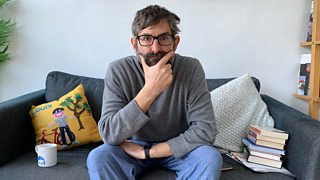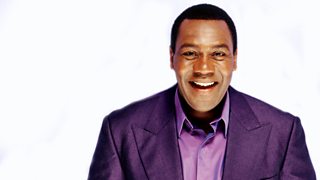Nine things we learned when Sir Lenny Henry spoke to Louis Theroux
In episode four of his lockdown podcast, Grounded with Louis Theroux, Louis interviews the comedian, campaigner and actor Sir Lenny Henry. The two talk about Lenny’s tough upbringing, experiencing racism on and off stage and the one habit he hopes to continue with once lockdown is over. Here are nine things we learned…

1. Lenny got his name from the doctor who delivered him
Lenny was named after a Dr Lenworth, and his full name is Lenworth George Henry. At home he was always called Len, but after he became famous his mum started to refer to him as Lenny. This upset him, as he felt his success in show business had influenced her attitude toward him. “Suddenly, Lenny off the telly was now in our house. I wasn’t Len anymore, and that caused me a great deal of heartache… I thought she’d changed like everybody else. I didn’t expect her to change, and she did change.”
2. Lenny thought a different man was his dad until he was 11
Growing up, Lenny thought his dad was his mum’s partner, who raised him. Then, when he was 10, he was sent to do chores for his “uncle Bertie” every Friday. Lenny used to clean Bertie’s bedsit for him and get given pocket money, with no idea that the man was actually his birth father. About a year later, he found out the truth when another of Bertie’s sons told him. He didn’t talk about it publicly until his 2019 autobiography and says: “that was a massive thing for me to have that in the open, ’cause I’d not spoken about that to anyone.”
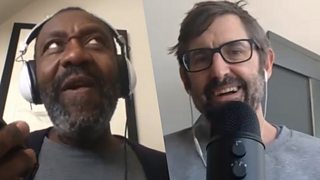
"What was your snog track?" – Lenny Henry
Clip from Grounded with Louis Theroux.
This woman was physically abusing me. And how do I feel about that?Lenny Henry on his mother
3. As a child, he experienced frequent physical violence
Lenny’s mum would beat him if he misbehaved, and once even used a frying pan. “I would have bruises,” he says. “I would have welts.” It made him fearful of a lot of things and meant he struggled to stand up for himself, which he regrets. Although Lenny used to joke about his mum’s strictness in his stage act, reflecting on it and writing about it has been difficult. He says, “you go, ‘Oh OK, this woman was physically abusing me. And how do I feel about that?’ And then in the end what you do is you go, ‘Oh well, that’s what mum was like’. But it’s still tough to remember and to re-experience”.
4. Lenny thinks his gift for impressions came from trying to integrate

Growing up in the West Midlands, Lenny faced frequent racism. He describes living in two worlds: at home, he felt Jamaican, but outside his friends were white and he did what they did. Lenny’s skill for mimicry first grew through trying to fit in and talk like everyone else, but later it “became this other thing of, well, how does John Wayne talk? How does James Stewart talk? And I can use that to make my friends laugh too.”
5. At first, he kept his talent for comedy hidden from his family
“In our house, my mum was the funny one,” Lenny says. If he had made wisecracks at home as a child, he knew it would have been seen as cheeky by his parents and resulted in punishment. So instead, he made jokes and did impressions to entertain his friends in the park. For quite a long time, Lenny’s family had no idea he could be funny. “It was like a little secret I held in my heart,” he says.
6. Lenny’s first gig was as Elvis Presley at a local disco
Although Lenny was a shy teenager, his friends pushed him to enter a talent contest. He performed as ‘wobbly Elvis’, singing Jailhouse Rock. The response, he recalls, was overwhelming: “It was like the first ever proper round of applause I’d ever received from an audience. I just thought, ‘That’s brilliant, and how do I get that again?’”
7. He felt deeply conflicted about appearing in The Black and White Minstrel Show
One of Lenny’s first TV jobs was on The Black and White Minstrel Show. Each week, he would do a short set of jokes and impressions, while the cast of ‘minstrels’ would perform song and dance numbers, the men wearing blackface. It’s a concept that was already being recognised as offensive. Looking back, Lenny feels his presence was a way for them to say, “How can we be racist? There’s a black guy in the show.”
As a teenager new to showbiz, Lenny was told to take the job as an opportunity to learn his trade but being part of the show made him feel “very lost for a period”. However, it also meant he could provide for his family, so they no longer had to live on the breadline. “I have to not be ashamed of that,” Lenny says. “Because that was a very, very, very positive thing. No matter how I was doing it, I was able to help my family.”
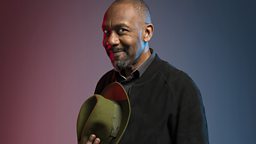
8. The alternative comedy scene changed his life
Working in the clubs, Lenny felt he had to do gags about being black to win audiences over. He describes it as “getting the joke in about my blackness first, before somebody else did... I didn’t want to be a 16-year-old kid being beaten up by a bunch of people who didn’t like me ’cause of the colour of my skin.”
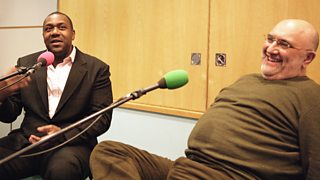
This all changed when he went to see an alternative comedy show featuring Alexei Sayle, Rik Mayall, Ade Edmondson, Dawn French and Jennifer Saunders. The night was made up of sketches and big characters, and the humour wasn’t racist or sexist. “I watched that and thought… You don’t have to do that clubland stuff anymore,” Lenny says. “And so for me, it was like a big curtain being pulled aside and a light shining in.” After that, he went on to have huge success with the sketch shows Three of a Kind and The Lenny Henry Show, before moving into drama and theatre.
9. After the lockdown is over, Lenny hopes to continue doing a daily walk
Lenny and his partner are spending the lockdown in the countryside. They’re surrounded by “sheep and grass and trees,” he says. “I always wanted that.” Although he’s been kept busy with meetings and writing a new book, they do a big walk at the end of each day. “I think that when this is all over, we might keep that going as a thing. To just go for a walk together. It’s lovely.”
More from Radio 4
-
![]()
Grounded with Louis Theroux: Lenny Henry
Lenny talks about his relationship with his mother, racism in the UK and disco βsnog tracksβ.
-
![]()
Desert Island Discs: Lenny Henry
Sue Lawley's castaway is comedian Lenny Henry.
-
![]()
Nine things we learned when Louis Theroux interviewed Helena Bonham Carter
Louis chats to the actor in lockdown.
-
![]()
The ultimate mix of songs for your kitchen rave
The ultimate mix of songs for your kitchen rave!

